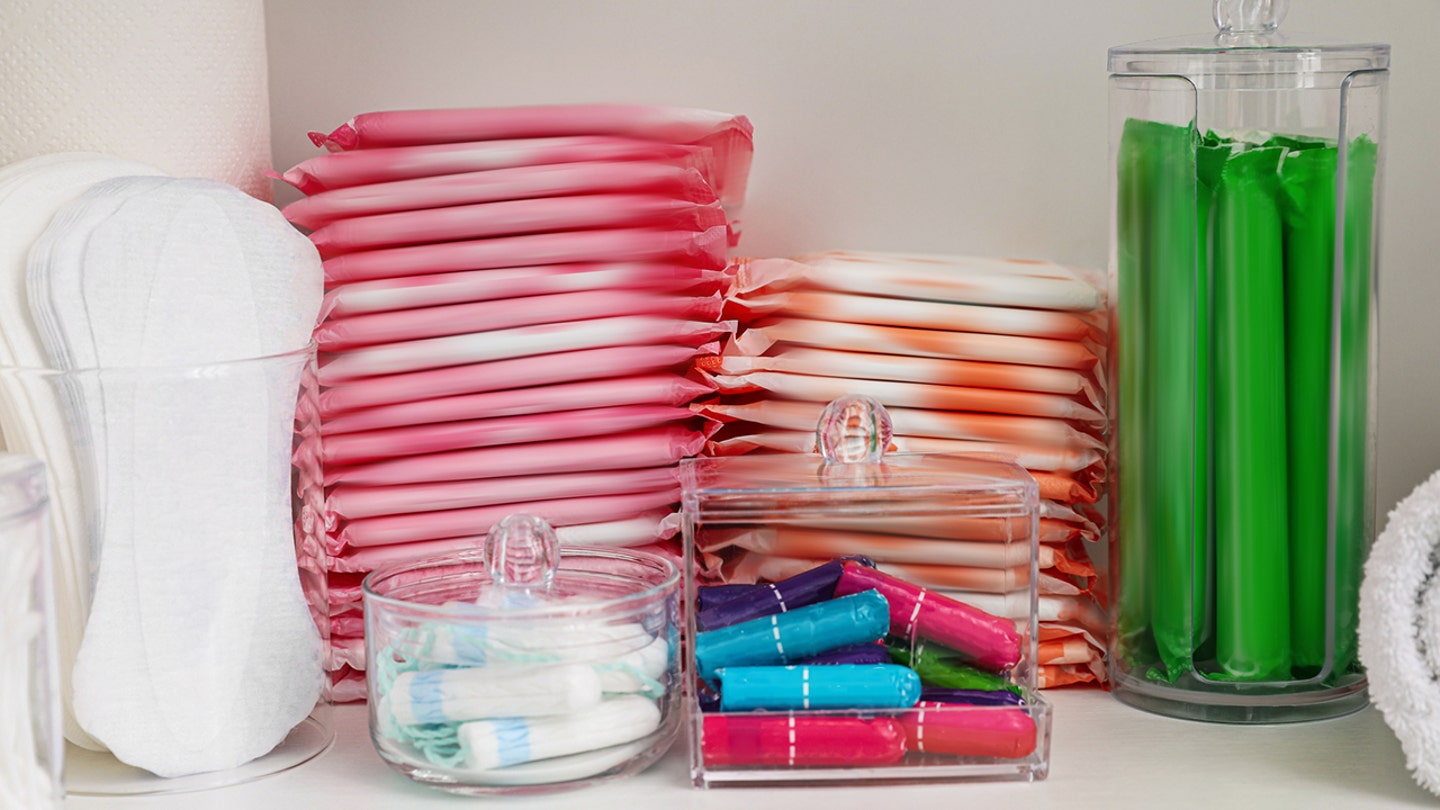A first-ever study about the presence of toxic metals in tampons is raising concerns about women’s health.
University of California, Berkeley Public Health released the results of this first-time research on July 3, revealing that tampons from several brands may contain toxic metals such as lead, arsenic and cadmium.
Millions of people — between 52% and 86% of menstruating women in the U.S. — use tampons for several hours at a time each month, according to UC Berkeley.
DOES SUNSCREEN CAUSE SKIN CANCER? DOCTORS DEBUNK CLAIMS GONE WILD ON SOCIAL MEDIA
As the researchers noted in their paper, which was published in the journal Environment International, the numbers are particularly troubling because the vagina has a higher potential for chemical absorption than any other part of the body.
Exposure to metals can increase the risk of dementia, infertility, diabetes and cancer, according to the university.
Between 52% and 86% of menstruating women use tampons on a regular basis, according to the researchers. (iStock)
Toxic metals can also damage the liver, kidney and brain, as well as the cardiovascular, nervous and endocrine systems, researchers warned.
Metals can also harm maternal health and fetal development.
“It’s time to make America healthy again and to protect consumers.”
Lead author Jenni A. Shearston, a postdoctoral scholar at the UC Berkeley School of Public Health, wrote in a statement that despite public health concerns, “very little research has been done to measure chemicals in tampons.”
She continued, “To our knowledge, this is the first paper to measure metals in tampons. Concerningly, we found concentrations of all metals we tested for, including toxic metals like arsenic and lead.”
WOMEN EXPERIENCE MORE DENTAL HEALTH ISSUES THAN MEN, EXPERTS SAY: HERE’S WHAT TO DO ABOUT IT
The study measured levels of 16 metals – arsenic, barium, calcium, cadmium, cobalt, chromium, copper, iron, manganese, mercury, nickel, lead, selenium, strontium, vanadium and zinc – in 30 tampons from 14 different (unspecified) brands.
Metal concentrations varied depending on whether tampons were purchased in the U.S. or Europe/U.K., whether they were organic or non-organic, and whether they were a store brand or a name brand.

Metal concentration levels varied by brand, location of purchase and type of tampon (organic versus non-organic), according to new research. (iStock)
Higher lead concentrations were present in non-organic tampons, while arsenic levels were higher in organic tampons.
Regardless of levels, “measurable concentrations” of all 16 metals were found in all types of tampons.
“No category had consistently lower concentrations of all or most metals,” the study said.
SENIORS AND BREAST CANCER: WHY AREN’T OLDER WOMEN TOLD TO GET MAMMOGRAMS?
“We detected all 16 metals in at least one sampled tampon, including some toxic metals, like lead, which has no ‘safe’ exposure level.”
Tampons can absorb metals in a variety of ways, such as through water, air, soil or a nearby contaminant, according to UC Berkeley.
“We detected all 16 metals in at least one sampled tampon.”
Some metals could be added intentionally by manufacturers “as part of a pigment, whitener, antibacterial agent or some other process in the factory.”
The researchers confirmed that it is unclear whether the presence of these metals contributes to negative health effects or not.
PREGNANCY-RELATED DEATHS BACK DOWN TO PRE-PANDEMIC LEVELS, CDC DATA SAYS
“Future research will test how much of these metals can leach out of the tampons and be absorbed by the body, as well as measure the presence of other chemicals in tampons,” the researchers stated.
Women’s health experts weigh in
Dr. Jillian LoPiano, a Miami-based OB-GYN and also chief health officer at the reproductive telehealth platform Wisp, confirmed in a conversation with Fox News Digital the danger posed by high levels of toxic metals like lead. She was not involved in the tampon study.
“Because they are ubiquitous in the environment, there are levels established for each type of metal that are considered acceptable exposure and are not known to cause dangerous side effects,” said the doctor.

Doctors agreed that manufacturers should test for toxic metals in their tampon products. (iStock)
The levels noted in the study were below the thresholds of concern, according to LoPiano, although the study has not investigated the effects of absorption.
Regardless, the OB-GYN stressed that manufacturers should “100%” test for toxic metals and should know which components and contaminants are in their products.
“It is extremely important for women to know what is in their products.”
TANNING PILLS CAN POSE SERIOUS DANGERS, DERMATOLOGISTS WARN: ‘CONSUMERS SHOULD BE AWARE’
Fox News medical contributor Dr. Nicole Saphier, M.D., director of breast imaging at Memorial Sloan Kettering Cancer Center in New York, told Fox News Digital that the results of this study are “concerning.”
“The vaginal lining is extremely absorptive, so any harmful chemicals or substances that are exposed to this region are likely to be absorbed through the tissue, potentially reaching the systemic (circulation) system,” warned Saphier, who also was not involved in the research.

Fox News medical contributor Dr. Nicole Saphier, M.D., director of breast imaging at Memorial Sloan Kettering Cancer Center in New York, told Fox News Digital that the results of this study are “concerning.” (Fox News)
As cases of cancer and autoimmune diseases are on the rise, Saphier said it’s “apparent” that environmental exposures “largely contribute” to the increased prevalence of disease.
“Some exposures we cannot do much to avoid, like air and microplastics,” she continued.
“However, women should be able to trust the menstrual and other health products being sold to them, as these are vital for women’s health.”
“Companies should be required to test for harmful toxins in products that are being sold for human consumption and bodily use.”
Health products that may be harmful is “unfortunately not novel,” Saphier mentioned, as other everyday products have been proven to contain chemicals that lead to disease.
“No wonder we have so many young people with cancer and autoimmune diseases these days,” she said. “Companies should be required to test for harmful toxins in products that are being sold for human consumption and bodily use.”
CLICK HERE TO SIGN UP FOR OUR HEALTH NEWSLETTER
She added, “The U.S. should look around the world at places that have already begun to ban products containing harmful ingredients. It’s time to make America healthy again and to protect consumers.”

For women who feel uncomfortable about using tampons based on this research, one doctor suggested some alternatives, including menstrual cups, discs, pads and period underwear. (iStock)
For women who feel uncomfortable about using tampons based on this research, LoPiano suggested some alternatives, including menstrual cups, discs, pads and period underwear.
For more Health articles, visit www.foxnews/health
LoPiano commended UC Berkeley on directing research toward understanding safety in women’s health.
“As with most research in women’s health, it is a good start and jumping-off point to collect more quality data, with which we can begin to draw conclusions and make recommendations to improve women’s lives and safety,” she said.
What to know about tampon regulations
The U.S. Food and Drug Administration (FDA) regulates tampons as medical devices, according to its website.
“FDA-cleared tampons are made of cotton, rayon, or a blend of the two,” the agency states on the site. “The absorbent fibers used in FDA-cleared tampons sold today are made with a bleaching process that is free from elemental chlorine, which also prevents products from having dangerous levels of dioxin (a type of pollutant found in the environment).”

The U.S. Food and Drug Administration regulates tampons as medical devices. (REUTERS/Andrew Kelly/File Photo)
Before tampons can be sold in the U.S., “they must go through the FDA’s review to determine whether they are as safe and effective as (substantially equivalent to) legally marketed tampons,” according to the agency.
CLICK HERE TO GET THE FOX NEWS APP
When contacted by Fox News Digital, an FDA spokesperson provided a statement about the study.
“The FDA is reviewing the study,” the agency said. “All studies have limitations. While the chemical method used indicates these metals are present in the tampons tested in the laboratory, the study does not assess whether any metals are released from tampons when used in the body. It also does not address whether any metal, if released, can be absorbed into the vaginal lining or, subsequently, into the bloodstream. We plan to evaluate the study closely, and take any action warranted to safeguard the health of consumers who use these products.”
Fox News Digital also reached out to the UC Berkeley researchers and several tampon manufacturers for additional comment.
